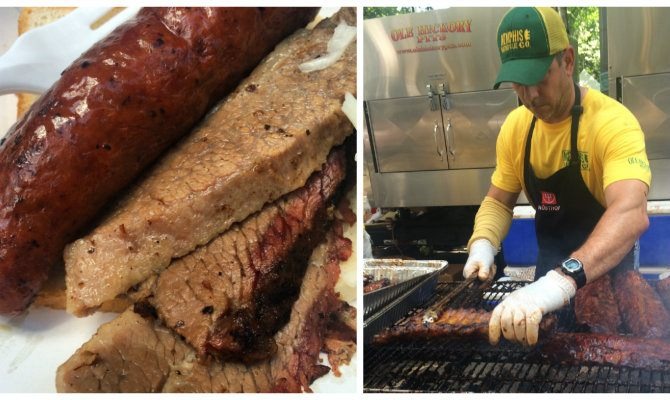Smoke Your Way To Heaven: Expert Barbecue Tips From America's Best Pitmasters
So, you want to be a barbecue master? We're not referring to the standard burgers and hot dogs you make for your family on the Fourth of July. We're talking about the all-American pit barbecue tradition, heavily steeped in the South, and lovingly referred to as "'cue." Pit barbecue is all about the smoked meats: succulent brisket on white bread, piles of glazed ribs, and pulled pork topped with just the right amount of sweet and tangy sauce — with a side of coleslaw, of course. The best barbecue starts with a mighty smoker, but you can even (fairly easily) make one yourself using a standard coal grill.
The Daily Meal got expert barbecue tips from some of the best "pitmasters" in America, from The Salt Lick down in Texas (where some say the best barbecue still resides) to the well-known barbecue up North, like Blue Smoke in New York City. We got the low-down while sampling some of the nation's top barbecue from 17 of America's pitmasters at the 13th annual Big Apple Barbecue Block Party this past weekend.
Here's what we learned:
Start with the right meat. "You need to start with a good, quality piece of meat. We always get the upper two-thirds choice or prime rib, nothing less," said pitmaster John Stage from Dinosaur Bar-B-Que in New York City. "Dry barbecue is not worth eating."
It's all about patience. "Barbecuing is all about time and effort. It takes a long time to cook, and you have to keep paying attention to the meat," said Scott Roberts, pitmaster at The Salt Lick. "We smoke our brisket for 16 to 20 hours."
Rubs and sauces. Every pitmaster will tell you: he or she is either a sauce person, or a dry rub person. But sometimes it's about both. Scott Roberts' sauce is "Southern style, but Tex-ified," with cumin, chile dulce, cayenne pepper, and other secret ingredients. Meanwhile, Tim Love of Woodshed Smokehouse in Fort Worth, Texas, is a dry rub fan. Each type of meat he cooks requires a different rub. For lamb brisket, he uses salt, pepper, cumin, rosemary, and thyme.
Meat falling off the bone is actually a bad thing. "Ribs are my thing, and they have to be nice and tender, sure," said John Wheeler, pitmaster at Memphis BBQ Co. in Mississippi. "But you don't want them falling off the bone, because that means they're overcooked. TGI Friday's wants you to think that's the way, but it isn't."
'Cue is all about the company you keep. "I could tell you to cook it low and slow, and the rubs, and the sauces, that's the technical way to get good barbecue," said Jean-Paul Bourgeois, the pitmaster at Blue Smoke in New York City. "But it's all about the people you're eating with. That's the biggest part of 'cue culture — sharing it with people around your table."
